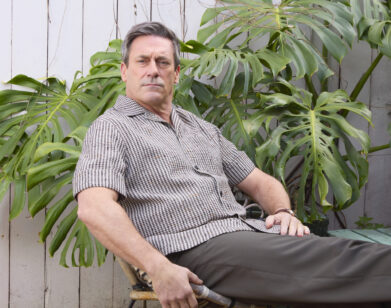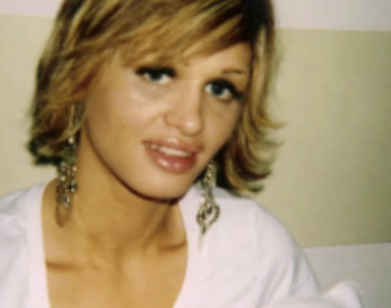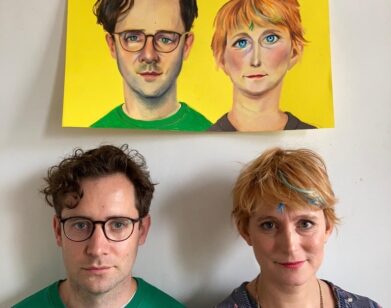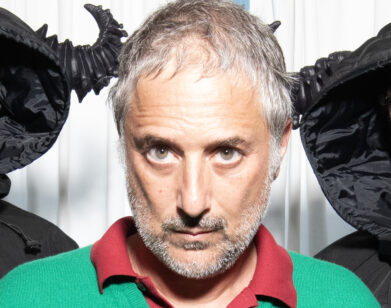The Impulse of Alex Ross Perry
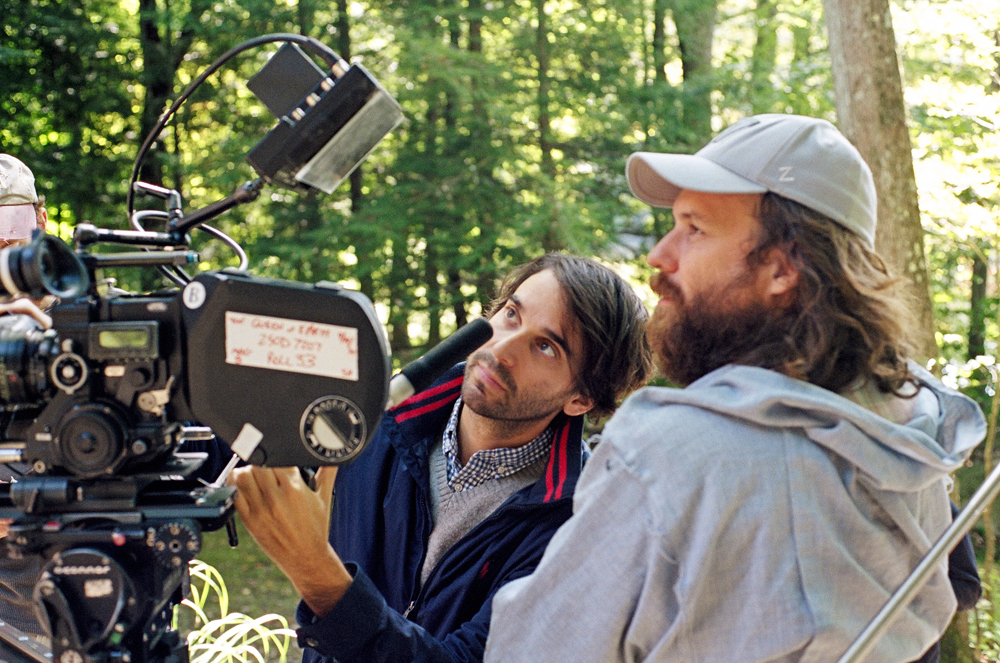
What would one define as the Alex Ross Perry touch? Probably a general sense of genre-pushing malaise, but perhaps Perry put it best in a recent Reddit AMA: “I make films about miserable people.” Following his 2009 debut film Impolex, the 31 year-old independent filmmaker and writer quickly developed a distinctive cinematic style—filled with melancholia, ennui, and subtle nods to the European auteurs of yesteryear—that often revolves around privileged millennials who somehow find themselves in perpetual bouts of misery. His latest film, the deeply unnerving yet sharply funny Queen of Earth (out tomorrow, August 26, in limited release), continues the trend.
Starring Elisabeth Moss and Katherine Waterston, Queen of the Earth depicts the convoluted relationship between two best friends. One summer, after the abrupt death of her father and breaking up with her long-term boyfriend, Catherine (Moss) retreats to a lake house owned by her friend Virginia’s (Waterston) family. What ensues is less of a standard girls-only trip and more of a complex web of hostility, resentment, and jealousy, which seamlessly leads to Catherine’s descent into a maddening psychological breakdown.
Queen of the Earth follows in the loose footsteps of Perry’s 2011 sophomore film, The Color Wheel, which chronicles two adult siblings on a road trip to pick up belongings from an ex-boyfriend, who also happens to be an old college professor. It was Perry’s next film, Listen Up Philip (2013)¸ however, that fully propelled the Pennsylvania native into the cinematic spotlight and left lasting marks. Starring Jason Schwartzman and Moss, Listen Up Philip follows a neurotic, self-absorbed, and successful writer (Schwartzman) who must always assert his intellectually deadpan dominance, even if it means eschewing the few relationships he has, including that with his longtime girlfriend (Moss). After meeting and retreating to the summer home of his equally misanthropic novelist idol (Jonathan Pryce), the resulting narrative is a scathing representation of New York’s literary scene.
His future work isn’t strictly desolate in nature, though. Earlier this year, Perry was tapped to write a live-action version of Disney’s Winnie The Pooh, which will reportedly focus on an adult Christopher Robin. He was also recently honored with a four-day retrospective at the Museum of the Moving Image in Queens. We caught up with Perry last week to learn more about Queen of Earth and how he’s immersing himself in the Hundred Acre Wood.
DEVON IVIE: I want to open with your retrospective at the Museum of the Moving Image. It must feel surreal to have a retrospective of your work with only four films on your resume.
ALEX ROSS PERRY: Yeah, in a way it does. People keep asking me that, like I should have some profound realization, like I’m retiring or something. It’s neat, I guess. It’s a little less distinctive of an event, because a couple of festivals this year have shown all four movies together. It’s more relevant for me because I’ve been such a fan of New York film institutions for as long as I could remember. It’s less like, “Isn’t it cool to have a retrospective?” And more like, “Hey, isn’t it cool that you’re having one at this movie theater where you saw all of these really important films 10 years ago?” That’s a significant moment. It’s never old having my movies screened at the theaters I love.
IVIE: When you began writing the screenplay for Queen of Earth, what was the fundamental question you asked yourself about the story that you wanted to tell?
PERRY: I don’t know what the question was, but I know that my curiosity was about privacy and entitlement, specifically entitlement to privacy. I went through a really long period where I was incredibly busy. I spent most of 2013 on the go for all of these different projects, and by the time the dust of that settled after Sundance, where Listen Up Philip played, I had a couple of weeks where the only thing that made sense to me was sitting at home completely idle. I really felt like I deserved that; I felt like I earned it.
Of course, part of the good stuff is that people wanted to see Philip, so I couldn’t [sit at home idlly] as much as I wanted. I was being pulled in different directions, trying to capitalize on the interest people had in me or in the film. So what happens then is that I would rather be at home. I’ve worked hard for a really long time; I want to take it easy until the winter is over. The emotion that came from that was really curious to me—what it means to really covet your own privacy while simultaneously leading a life that made the idea of that totally absurd. Obviously I’m talking about myself, an independent filmmaker, so there are real celebrities for which this is much more of a substantial issue, but my little tiny scrap of it was enough to make me say, “Hey, I wonder what the deal is with the way this stuff pans out usually,” and it all came from there. Specifically, once it became an opportunity to make a psychotic women’s picture, which is a grand tradition, then the idea of privacy for women became a totally relevant thing to tie the whole package around.
IVIE: Did you conduct any research to better understand the different stages of a psychological breakdown, or did it flow freely when you started to write?
PERRY: Definitely no research of the academic variety. The stages of the breakdown are, to me, initially what I want to watch and what I think will be fun. I think that’s coming from the history of me knowing and appreciating other films that deal with that sort of thing and being aware of the rules of the genre that I’m trying to participate in—and knowing the hallmarks, what you need to do, what you shouldn’t do, and so forth.
We could go with academic research about medical or mental problems, but then the whole emotion of it is just going to be underwhelmed. There’s an impulse that comes in the moment and if it betrays the research that we’ve done, then what do we do? Do we follow it or do we stick with what we’ve already decided? It’s much more interesting for me, certainly, to create a scenario in some loose sense. Whether it’s real or not doesn’t make a difference. When the performers come in and take over, it’s whatever feels natural as opposed to whether or not whatever I’ve researched is correct.
IVIE: How would you define the relationship between Catherine and Virginia?
PERRY: There’s antagonism in it, but it’s another example of the sort of thing that ended up being the central relationship in my last few movies. There’s one situation I’m really curious about in the time of the writing, and then I split it into two opposing characters, and then the drama comes from the conflict between the two of them as the situation plays out. They represent different sides of the same perspective. In the film you have those slashes where you see bits and pieces of last year, where you see their relationship in a different place than you see it now.
My goal and my hope and dream of cinema, in modern independent cinema, is that I want the story and the characters of these two women to be very objective. I don’t judge either one of them worse than the other. I don’t say to the audience in the story, “Look, Catherine is a victim; Virginia is being a bad friend.” Nor do I say, “Catherine’s out of her mind and it really sucks to be Virginia.” It’s much more interesting to me to present an objective playing field for the audience to engage in their own way during the film and then hopefully after it stays with them. My opinions on the characters are what they are and could differ from the actress’s opinion on the characters and the cinematographer’s opinion on the characters. It’s all very neutral.
IVIE: I found it compelling to see the power dynamics of the friendship constantly shift back and forth throughout the course of the film.
PERRY: That’s where the drama comes from. There are scenes where you might think, “Oh god, poor Virginia,” but the next scene you think, “Wow, she’s really taking this a little too far in antagonizing her friend when she really needs help.” It’s a fun way to keep the game going between these two women.
IVIE: Where did you film? The location around the lake house is beautiful.
PERRY: It’s in a town called Carmel, New York, about two hours north of the city. It’s quite close to Poughkeepsie.
IVIE: Listen Up Philip was a much larger production in terms of filming locations and the cast. Did you find yourself preferring the smaller-scale production of Queen of Earth?
PERRY: It depends. In a sense it’s apples and oranges because the scope of what we were putting on camera for Queen of Earth didn’t require 33 percent of the manpower of Listen Up Philip. Had we had the same size crew on this little single-location movie, it would’ve been a nightmare. I believe we would’ve moved much slower. At the same time, if we had a 12-person crew for Philip, we still would be making it.
I think there’s something valuable in understanding that, as a filmmaker, not every movie needs to be bigger than the one before it, and not every movie needs to be done with the same working conditions. That’s something that the producer, Joe Swanberg, was really instrumental in helping me work through. Because Listen Up Philip was my third film, every film had been bigger than the one before it, and of course that’s what you think you should do. And he said, “Why? If you have any ideas that you can make in one location, then just go through it. You don’t need to make it a big and expensive production. Let’s just get it done. Let’s get some actors and as few people as we need and we’ll just make this little movie exactly the way we want, and it’s an interesting lesson.” Otherwise I’d be sitting here with no movie.
IVIE: This is your second time working with Elisabeth Moss. Did you write the part with her in mind?
PERRY: I started writing it for a number of reasons—for my own curiosity and not really knowing what the character was going to end up being. First, it’s a really abstract idea, the scenes and moments I want to see these characters in, but by the time I was halfway done with the script I was thinking, “Boy, this would sure be a great opportunity to give her something major and interesting to sink her teeth into.” At that point, I had only been talking with Joe about it. I finished the script and sent it to him and her at the same time. I said, “Hey, I love this, it’s going to be a really fun character and I believe we’ll be able to make this movie exactly the way we want, I’m curious what your take is.” The next day she said, “Yeah, I think we should do this.”
IVIE: I noticed that one the books Virginia is reading in a particular scene is by Zimmerman, the eccentric author from Listen Up Philip. Do you think you’ll continue these playful references to your past films in your future films?
PERRY: I don’t know. I don’t love stuff like that. It’s fun sometimes. We just needed books for the set and we have access to those, of course. We brought them in and Katherine [Waterston] had seen Listen Up Philip and she said, “Oh man, you have the books here, these are so nice looking, I would love to hold one in the movie.” I said, “Well sure, whatever. You need to hold something in the scene. It’s either a book where we don’t see what the cover is because we don’t want to bother with getting the rights to it, or you could just have this and everybody wins.” It’s a fun little thing, and I love fun little things. To me, I think it would’ve been a little more fun if it was on a bookshelf somewhere and one out of a hundred viewers notices it. I like the idea that this movie takes place in the same universe.
IVIE: Why title it Queen of Earth?
PERRY: This goes back to what I was talking about earlier. The biggest thing I was thinking about when I was coming up with this movie, before the title, was about entitlement, and in conjunction to that, female entitlement and female privacy. So all of that stuff was on my mind throughout the genesis of the project. I knew that Listen Up Philip had this “get out of the country” element in the second half of the movie, but in the beginning of the film it’s the foundation of the story—it’s very city-oriented. I knew there would be a film about the natural world and the creeping, unsettling qualities that are eerily quiet and natural that only a serene location could have. So I combined all of those things.
IVIE: What can you tell me about your upcoming live-action version of Winnie the Pooh? What stages of development are you in?
PERRY: I’m just writing it these days, I’ve been writing it all summer. All I can say about it is that it’s a neat opportunity for a guy like me, who has made these little idiosyncratic films, to dip my toes into this world of screenwriting. Personally and fundamentally, this is a world that I’ve loved since I was two or three years old, and these characters mean the world to me. There’s nothing anybody working on something like this would ever do than uphold the legacy of these characters. We all know and love them. Anyone thinking this would be some modern revision thing need not worry. I don’t really know how much there is to say—every day that I write it I get to hang out with all of these silly animal friends, and it’s a good day.
IVIE: Is it daunting taking on such as iconic figure, or are you at ease?
PERRY: I’ve been working on it for a very long time at this point. There’s a sense of ease, but preparing for it and pitching for it was daunting. Once I got the job I had this horrible realization that I actually have to create words to be spoken by this legendarily iconic character. I’ve never done that before. Forget writing something children can enjoy, forget writing something that could play on thousands of screens instead of dozens, but I’ve never put the words in the mouth of a character that I didn’t create, much less a character that billions of people around the world know. That was daunting for a week, but then I got over it. [laughs]
QUEEN OF THE EARTH WILL BE OUT IN LIMITED RELEASE TOMORROW.

